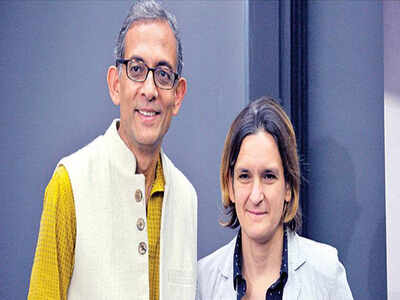
THIRUVANANTHAPURAM: Their efforts to revive development economics, particularly through the popularisation of ‘randomised control trials’ (RCT) has won Abhijit Banerjee-Esther Duflo couple the Nobel Prize in Economic sciences in 2019. But the famed economists had failed to impress the government of Kerala when they visited the state and proposed the application of RCT to scientifically deduce the potentiality of Ardram Mission project that was conceived to convert primary health centres to family health centres.
In one of her papers ‘The Economist as Plumber’ published in 2017, Duflo explained the ordeal that she, Banerjee and Gita Gopinath, IMF chief economist and former adviser to Kerala chief minister, had to face when the trio dropped in at the secretariat on an invite to discuss the project.
Duflo explains in detail how indifferently a retired professor who was in charge of the implementation of the project took their questions. “It turns out that policy makers rarely have the time or inclination to focus on them, and will tend to decide on how to address them based on hunches, without much regard for evidence,” she said. She said the former additional chief secretary (health) Rajeev Sadanandan could spent only a little time with them and had left them with a retired professor in charge of the project implementation for interacting with them. The interaction was, however, disparaging, she said.
“Abhijit Banerjee, Gita Gopinath and I recently spent a few hours with bureaucrats and consultants from the health department in the state of Kerala, in the south of India. Kerala is one of India’s most successful states, at least as far as the social sector. It is starting to face first-world problems: an aging population, high prevalence of hypertension, diabetes and obesity... Their best idea is to reform the public primary health care system in order to make it more attractive to customers (who for the most part seek their health care in the private sector, like elsewhere in India), and to instate better practices of prevention, management, and treatment... Though the additional chief secretary (top bureaucrat) in charge of health had invited us to the meeting, he was called away to deal with a doctors’ strike around the time the conversation turned to the specifics of the reform. He handed us over to a retired professor and a retired doctor, who have been charged with designing the specifics of the policy. This in itself is symptomatic: top policy makers usually have absolutely no time for figuring out the details of a policy plan, and delegate it to ‘experts’,” she said in the paper.
“In our conversation, we started to push on some specific questions on the model that they had in mind: why would patients pay attention to a nurse, given that until now they have only taken doctors seriously?...What was striking was, not only did they not have any answer to these questions, but they showed no real interest in even entertaining them, ” she added.
In one of her papers ‘The Economist as Plumber’ published in 2017, Duflo explained the ordeal that she, Banerjee and Gita Gopinath, IMF chief economist and former adviser to Kerala chief minister, had to face when the trio dropped in at the secretariat on an invite to discuss the project.
Duflo explains in detail how indifferently a retired professor who was in charge of the implementation of the project took their questions. “It turns out that policy makers rarely have the time or inclination to focus on them, and will tend to decide on how to address them based on hunches, without much regard for evidence,” she said. She said the former additional chief secretary (health) Rajeev Sadanandan could spent only a little time with them and had left them with a retired professor in charge of the project implementation for interacting with them. The interaction was, however, disparaging, she said.
“Abhijit Banerjee, Gita Gopinath and I recently spent a few hours with bureaucrats and consultants from the health department in the state of Kerala, in the south of India. Kerala is one of India’s most successful states, at least as far as the social sector. It is starting to face first-world problems: an aging population, high prevalence of hypertension, diabetes and obesity... Their best idea is to reform the public primary health care system in order to make it more attractive to customers (who for the most part seek their health care in the private sector, like elsewhere in India), and to instate better practices of prevention, management, and treatment... Though the additional chief secretary (top bureaucrat) in charge of health had invited us to the meeting, he was called away to deal with a doctors’ strike around the time the conversation turned to the specifics of the reform. He handed us over to a retired professor and a retired doctor, who have been charged with designing the specifics of the policy. This in itself is symptomatic: top policy makers usually have absolutely no time for figuring out the details of a policy plan, and delegate it to ‘experts’,” she said in the paper.
“In our conversation, we started to push on some specific questions on the model that they had in mind: why would patients pay attention to a nurse, given that until now they have only taken doctors seriously?...What was striking was, not only did they not have any answer to these questions, but they showed no real interest in even entertaining them, ” she added.
Trending Topics
LATEST VIDEOS
More from TOI
Navbharat Times
Featured Today in Travel
Get the app







